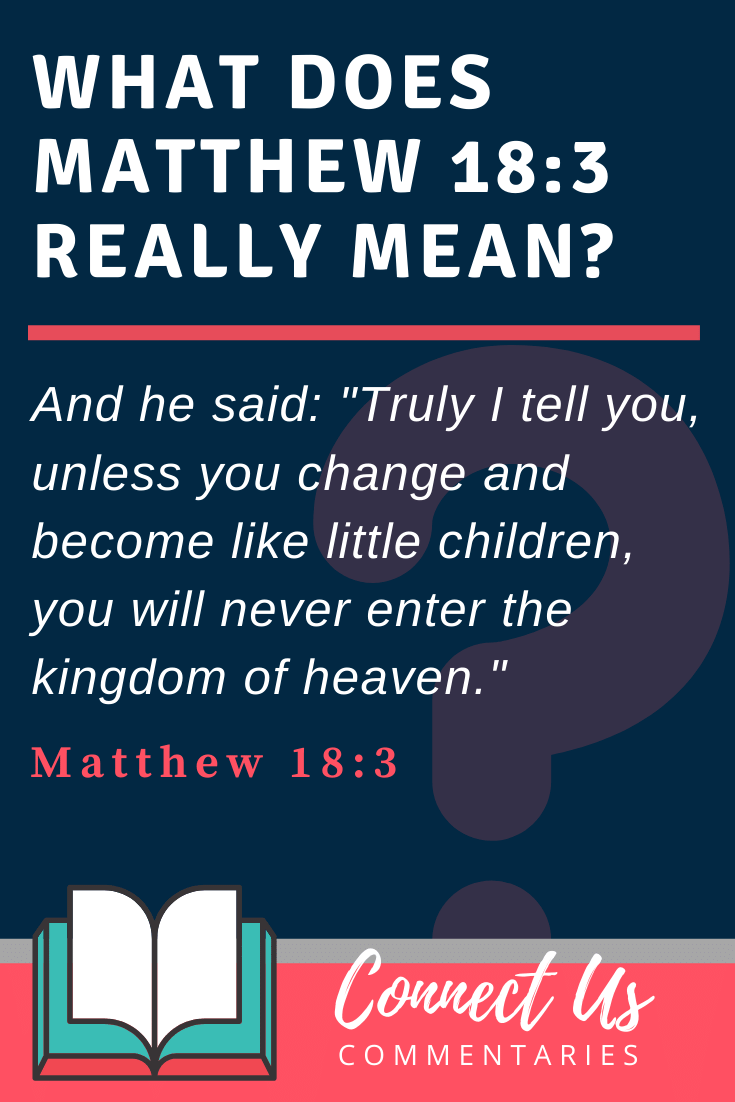Matthew 18:3
“And he said: ‘Truly I tell you, unless you change and become like little children, you will never enter the kingdom of heaven.’”
Explanation and Commentary of Matthew 18:3
The disciples asked the question, “Who then is the greatest in the Kingdom of Heaven” (Mt 18:1)? The question betrays the fact that the disciples are not yet completely of the Kingdom of Heaven. The Kingdom of Heaven is not a place where the members consider their own greatness. There is no scorekeeping. There are no “great ones” (Mk 10:42). In the kingdom of Satan, the dominion of darkness, the world, people fight and claw to climb the ladders of status and importance. That is a way of self-justification that has no merit in Jesus’ economy.
God will put certain people in certain positions of authority as he wills (Mt 19:28), but it is never to elevate one in importance and value over another. Jesus consistently pointed to children for an example of how to be citizens of his Kingdom. Childlike faith is a virtue. Childlike trust in the Father is a virtue, but this is so counter-cultural and contrary to the nature of satan in the unbeliever that the disciples would not come close to living it until after Pentecost when they are empowered by the Holy Spirit.
It is so good to trust in God the way a child would trust his good and powerful (to the child) earthly father. Children trust their parents for wisdom, provision, protection, order, and vision. Christians who learn to trust their Heavenly Father in the same way will live life abundantly (Jn 10:10) and bear the light yoke of Christ (Mt 11:30).
Breaking Down the Key Parts of Matthew 18:3
#1 “And he said: ‘Truly I tell you,”
Again, Jesus makes this declaration in response to the question raised by the disciples who would be the greatest in the Kingdom of God. Calling a child to him, he says, “Truly I tell you…” Jesus always spoke the truth, but when he accented his statement with “truly,” or “truly, truly,” what followed was a key biblical principle.
#2 “unless you change and become like children,”
It is fascinating that Jesus is speaking to his disciples when he says this. They were with Jesus but had not entered the Kingdom, and they would not until they changed. Jesus told Nicodemus that he “must be born again” to enter the Kingdom (Jn 3:3). This means that being regenerated comes with this child-likeness. To seek first the Kingdom of God and his righteousness (Mt 6:33), one must be able to “see the Kingdom.” To see the Kingdom, one must be changed.
#3 “you will never enter the Kingdom of Heaven.”
How sad to see the Kingdom, but never enter it. The gate is narrow, as is the path (Mt 7:13). To become like children in the sense that Jesus is speaking of requires one to pick up his or her cross and follow in the footsteps of Christ, dying to self, crucified with and hidden in Christ (Gal 2:20). We must lay down self-importance and trust our Father with everything.
Bible Study on Matthew 18:3
Expert Overview of Matthew Ch. 14-28
Biblical Translations of Matthew 18:3
NIV
And he said: “Truly I tell you, unless you change and become like little children, you will never enter the kingdom of heaven.”
NLT
Then he said, “I tell you the truth, unless you turn from your sins and become like little children, you will never get into the Kingdom of Heaven.”
ESV
And said, “Truly, I say to you, unless you turn and become like children, you will never enter the kingdom of heaven.”
KJV
And said, “Verily I say unto you, Except ye be converted, and become as little children, ye shall not enter into the kingdom of heaven.”
NKJV
And said, “Assuredly, I say to you, unless you are converted and become as little children, you will by no means enter the kingdom of heaven.”

Natalie Regoli is a child of God, devoted wife, and mother of two boys. She has a Master's Degree in Law from The University of Texas. Natalie has been published in several national journals and has been practicing law for 18 years.